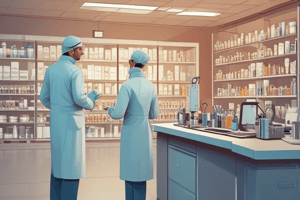Podcast
Questions and Answers
What is one common error that can occur in medical laboratory sample management?
What is one common error that can occur in medical laboratory sample management?
Mislabeling of samples.
How can critical thinking improve sample management in medical laboratories?
How can critical thinking improve sample management in medical laboratories?
It enables staff to identify potential errors and implement corrective actions.
Describe a strategy to minimize errors in medical laboratory sampling.
Describe a strategy to minimize errors in medical laboratory sampling.
Implementing a double-check system for sample labeling.
What role does training play in preventing errors in sample management?
What role does training play in preventing errors in sample management?
Why is it important to apply critical thinking when interpreting laboratory results?
Why is it important to apply critical thinking when interpreting laboratory results?
How does critical thinking influence decision-making in quality management for medical laboratories?
How does critical thinking influence decision-making in quality management for medical laboratories?
What are potential consequences of neglecting critical thinking in laboratory quality management?
What are potential consequences of neglecting critical thinking in laboratory quality management?
Identify a key practice in critical thinking that can be applied to assessing laboratory processes.
Identify a key practice in critical thinking that can be applied to assessing laboratory processes.
Explain how peer review in laboratory settings serves as a tool for critical thinking.
Explain how peer review in laboratory settings serves as a tool for critical thinking.
In what ways can documentation support critical thinking in a laboratory's quality management system?
In what ways can documentation support critical thinking in a laboratory's quality management system?
Flashcards are hidden until you start studying
Study Notes
Common Errors in Sample Management
- Mislabeling samples can lead to incorrect patient results and potentially dangerous clinical decisions.
- Contamination of samples during collection or handling may compromise the integrity of the tests.
Critical Thinking in Sample Management
- Critical thinking enables lab personnel to evaluate procedures and outcomes systematically.
- It enhances the ability to identify patterns, anomalies, and potential errors in sample handling.
- By questioning assumptions and examining data critically, lab professionals improve accuracy and reliability of results.
Strategy to Minimize Errors
- Implement standardized protocols for sample collection, labeling, and storage to ensure consistency.
- Regular audits of sample management processes can help identify areas for improvement and error reduction.
Role of Training in Error Prevention
- Comprehensive training programs ensure all staff understand procedures and the significance of sample integrity.
- Continual education helps employees stay updated on best practices and technological advancements in sample management.
Importance of Applying Critical Thinking
- Applying critical thinking when interpreting laboratory results leads to better-informed clinical decisions.
- It helps to assess the validity of results, considering patient history and other relevant factors.
- Critical thinking is essential for recognizing when results deviate from expected ranges, prompting further investigation.
Studying That Suits You
Use AI to generate personalized quizzes and flashcards to suit your learning preferences.




